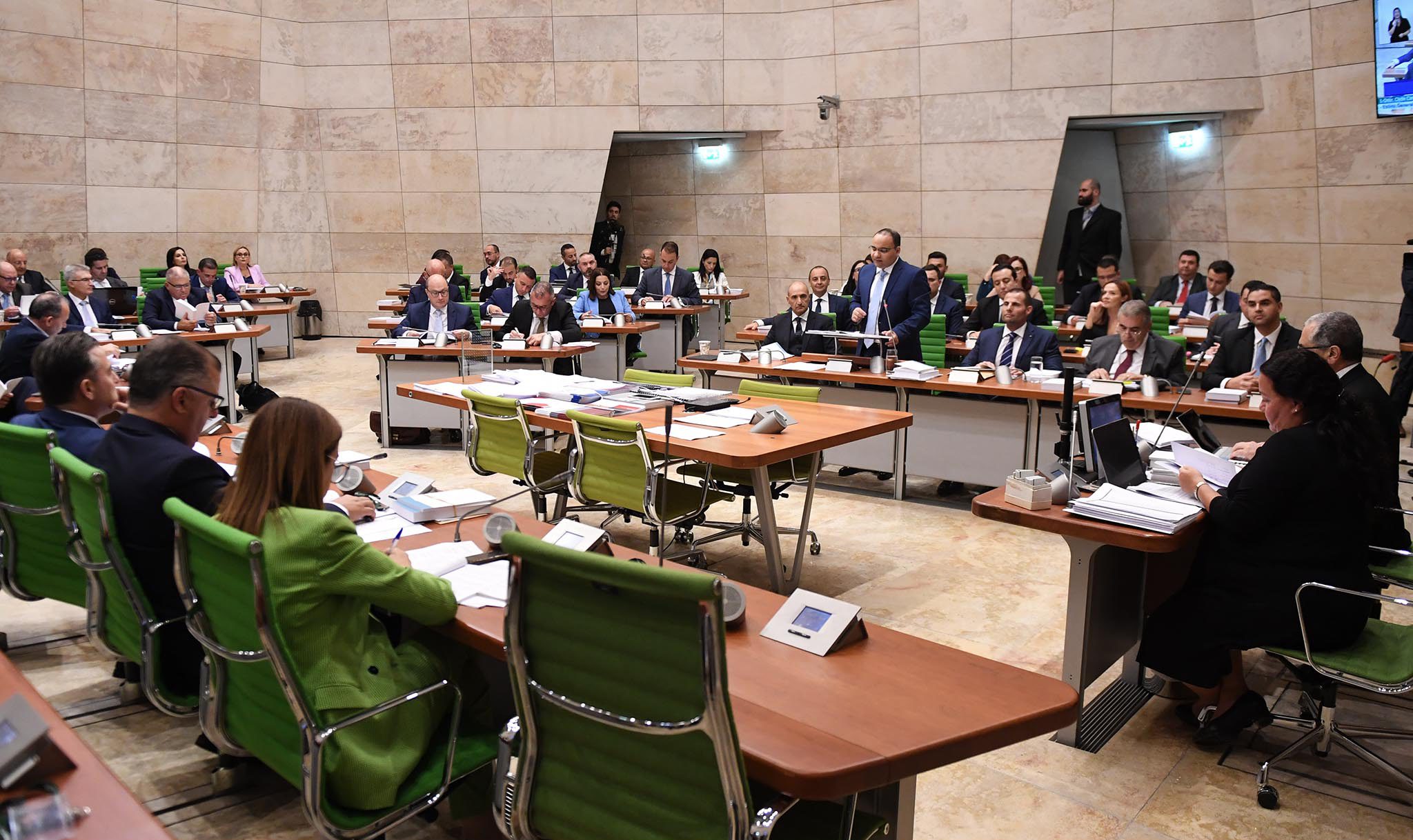Reactions have already started pouring in across various sections of Malta’s private sector to the Budget 2023 announcement that was delivered on Monday night in Parliament.
Across the Board, there is agreement that the Government has acted swiftly to safeguard Malta from the energy crisis via a €600 million subsidy for energy and staple foods, and has done well to navigate the country through the latest economic crisis by maintaining the status quo.
However, Government has been taken to task for not acting boldly enough in re-engineering the economy towards a more sustainable, future-proof version that is more resilient to future shocks. Government has also been criticised for ignoring a long-term economic plan, and for failing to address the serious labour market shortage that persists in Malta, impacting business’ operations.
Here’s a look at how Malta’s constituted bodies reacted to Finance Minister Clyde Caruana’s Budget 2023 announcement:
A budget that preserves our current economic model – The Malta Chamber of Commerce, Enterprise and Industry
Bolder measures needed for a more sustainable economic growth model
It is evident that Government is using all the financial resources it has available to maintain stable energy prices and to safeguard the spending power of lower income groups against the backdrop of persistent inflation. This is essentially a policy of preservation of our economy – with all its strengths and weaknesses. We would have liked to see more ambition with respect to sustainability beyond the continuation of existing schemes for the purchase of electric vehicles. We would also have liked to see more tangible support with respect to innovation and new economic niches that can guarantee sustainable economic growth.
It is positive to note that Government acknowledges that in spite of all the investment in roads and free public transport, traffic congestion has not improved and is therefore seeking to engage with stakeholders to limit circulation of certain service vehicles before 9am. Similarly, it is encouraging to see The Malta Chamber’s proposal for the establishment of a Board for the assessment of quality and aesthetics features of new developments taken on board. These two relatively minor proposals are examples that can improve the quality of life of people. The bulk of proposals are actually directed at maintaining spending power rather than improving quality of life. While subsidising energy and maintaining spending power is good for business, the country needs a longer-term strategy to be future-ready.
The financial projections presented rely on Government’s ability to raise funds through the issue of Government stocks and presume a modest negative impact on our exports against the prospect of a looming recession in Europe. The extent to which a recession in Europe will impact our manufactured exports as well as tourism will be a determining factor for the performance of our economy in 2023.
A Budget of continuation that safeguards Malta from energy price hikes but more action on other crucial challenges is missing – The Malta Chamber of SMEs
The Malta Chamber of SMEs welcomes the continued confirmation that the Government will be extending the safety net of protecting Malta from the international hikes of energy prices. This is by far the biggest threat Malta is facing at the moment.
Another positive element found in this Budget is the extension and widening of the Rent Subsidy Scheme, as proposed by the Malta Chamber of SMEs, that will help Malta mitigate the impact of freight costs. Positively noted is the work being done to tackle issues with banking services and the increased importance being given to aesthetics in the development of buildings.
Apart from this the budget is a continuation of the 2022 budget, where it concerns SMEs.
Disappointingly, the Budget fails to effectively tackle other major challenges which are choking businesses. Very serious issues have merely been given a mentioned in this Budget speech, which falls too short from the action that Malta should be taking at the moment, as a stage of implementation.
The serious employment crisis, suffocating bureaucracy and impossible traffic, merited more than simply being mentioned in this budget. These issues are seriously affecting productivity and we cannot afford to start thinking of policies now, with no solution, nowhere on the horizon.
‘Strong headwinds, importance of firm hand on the tiller’ – The Malta Hotels and Restaurants Association
The Malta Hotels and Restaurants Association (MHRA) refers to the Budget 2023 communicated by the Minister of Finance Clyde Caruana as a war chest addressing current unprecedented global economic challenges. MHRA President Tony Zahra states, “the Government’s 600 million investment in energy represents approximately 10% of Malta’s budget and this must be the most important budgetary measure towards ensuring the continued sustainability of the tourism industry.”
MHRA notes that countries which have not been as bold as Malta in subsidizing energy costs are finding that a lot of small and medium sized enterprises are struggling to stay afloat. MHRA believes that this budgetary measure was necessary to ensure the continued good health of the tourism and hospitality sector.
Mr Zahra also remarks that air connectivity remains the key to a successful economy especially the tourism sector where 99% of tourists arrive by air. In this respect Air Malta remains the most important channel for the industry and MHRA reiterates that the national airline must continue flying without any interruptions what ‘so ever.
With reference to the product, MHRA notes that once again reference is being made to the restructuring of the Tourism Zones Foundation for more effective embellishment and for the regeneration of tourism designated areas across Malta and Gozo. However urgent attention needs to be given to ensure a better upkeep and cleanliness level of these zones.
MHRA welcomes the investment towards the infrastructure, particularly road network, electricity distribution and water production, but notes that equally important is investment in the drainage system.
MHRA is pleased to note that works on the ITS Campus is to commence next year, as labour supply remains a critical success factor for the industry.
MHRA also commends wide ranging social benefits aimed announced and tax incentives related to emoluments of employees working in the tourism sector.
A Budget that is focused on short-term stability – Malta Employers Association
On a macro scale, the main feature of the budget is government’s decision to shoulder increase in fuel, energy and cereal prices on businesses and consumers to maintain economic stability and price competitiveness. This is fundamental in a global scenario where many countries are experiencing rates of inflation which have been unheard of for more than 40 years.
The budget has adopted targeted approach, ensuring discipline in government expenditure whilst taking active measures to support family income without undue burdens on businesses. This appears to have taken precedence over capital expenditure.
Government is fine tuning numerous social benefits to spread a feelgood feeling among a large cross section of the population. It has announced numerous business incentives for better regulation and technical support to adopt ESG criteria in business, and also digitalisation and internationalisation.
In the current situation, government does not have much room for fiscal manoeuvrability, and for the fiscal targets to be attained, it becomes even more imperative that government exercises discipline in its spending, and to curtail unnecessary expenditure such as unproductive employment in the public sector and extravagant activities of dubious national benefit.
The MEA agrees with the Minister’s announced objective to have a viable national airline. The Association added that for such an objective to be realised, the airline must be run on a commercial basis, free from politically motivated interference.
All in all, while the budget speech addressed the immediate issues, which might be understandable in an uncertain global situation, the MEA notes that this has to has to accompanied with a longer term economic direction. This includes a clear human resources strategy which should follow the exercise of the census of skills, together with a plan for economic transformation to maximise the country’s economic potential whilst safeguarding the people’s quality of life.
Featured Image:
Finance Minister Clyde Caruana delivering Budget 2023 announcement in Parliament / DOI Photo – Clifton Fenech
Tender for new Malta Film Studio sound stage to be issued in the next few weeks
The project is aimed to significantly expand the island’s capacity to host large-scale international film productions
ESET’s security offering combines AI and human approaches within a ‘unified ecosystem’
The cybersecurity firm designs individual risk detection and response frameworks for clients across the globe
Planning Authority launches €5 million Irrestawra Darek Scheme for Reġjun Nofinshar
The Planning Authority has also announced an additional €2 million for the restoration of Scheduled Buildings






